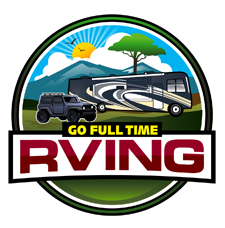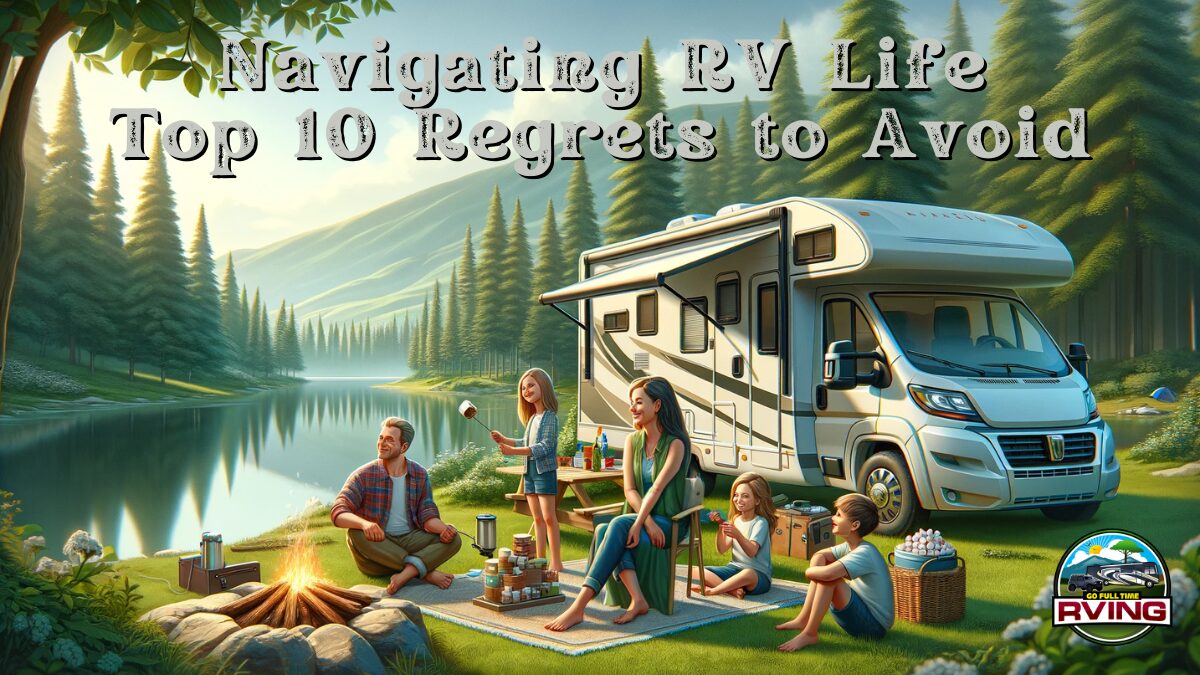When people dream about full-time RV living, it’s often with visions of endless freedom, stunning campgrounds, and life on their own terms. And while full-time RVing can be all of those things, the reality comes with its own set of challenges. Over the years, we’ve seen common regrets that new RVers face—mistakes that can cost money, time, and peace of mind.
To help you avoid those pitfalls, here are 10 full-time RVing regrets and how to avoid them.
- 1. Underestimating the True Costs of RV Life
- 2. Neglecting to Research the Right RV
- 3. Overlooking Insurance and Legalities
- 4. Lack of Space and Privacy
- 5. Social Isolation
- 6. Internet Connectivity Issues
- 7. Weather and Climate Challenges
- 8. Difficulty in Routine Health Care Access
- 9. Maintenance and Mechanical Failures
- 10. Lifestyle Burnout
- Final Thoughts on Full-Time RV Regrets
This post contains affiliate links. As a participant in Amazon Associates and various affiliate programs, we are compensated when qualifying purchases are made through our referral links at no additional cost to you. Full Disclosure
1. Underestimating the True Costs of RV Life
Many start RVing thinking it’s cheaper than owning a home. But the hidden expenses can be surprising:
- Maintenance Costs: RVs, like any vehicle, require regular maintenance. However, the maintenance for an RV can be more costly than for a typical car, especially for larger models or those with specialized features. Regular tasks include servicing the engine, maintaining the brakes and tires, and ensuring that all RV-specific components like slide-outs, leveling systems, and wastewater tanks are in good working order.
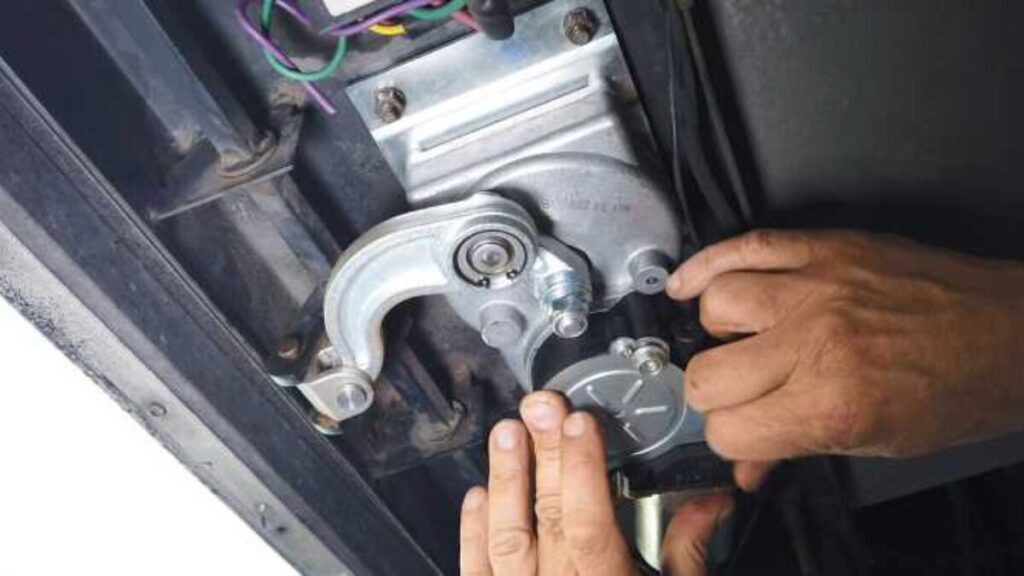
- Fuel Expenses: Fuel is a major expense, particularly for larger, less fuel-efficient models. Since RVing involves substantial driving, fuel costs can fluctuate greatly and are subject to market prices. Long-distance travel, common in full-time RVing, can lead to substantial fuel bills.
- Campsite Fees: While free camping options are available (like boondocking on public lands), many full-time RVers opt for the amenities and security established campsites offer. These sites, especially those in popular or scenic locations, can charge significant nightly fees. These fees often include utilities like electricity and water but can still add up quickly over time. We have spent as little as $0.00 and as much as $175.00 per night on campgrounds. To help our budget stay in check, we use our Thousand Trails membership as often as possible.

If you’re curious about the Thousand Trails system, the Camping Pass is a great way to test the waters without a big commitment.
👉 Click here to save $100 on a Thousand Trails Camping Pass – many RVers start here and end up saving thousands over time.
- Unexpected Repairs: RVs are complex machines, and unexpected repairs are common. These can range from minor issues to major system failures. Repair costs can be high, and the inconvenience of dealing with these issues on the road can add to the stress and overall expenses.
- Insurance and Registration: Insurance costs for an RV can be higher than for a standard vehicle, especially if the RV is classified as a full-time residence. Additionally, registration fees can vary significantly depending on the state of registration.
- Connectivity Costs: For those who work remotely or wish to stay connected, investing in a reliable internet connection is essential. This often means purchasing additional equipment like signal boosters or subscribing to more expensive mobile data plans.
- Lifestyle Expenses: Full-time RVing can also lead to increased spending in other areas, such as dining out more often due to the smaller kitchen space and less grocery storage, or spending on activities and attractions in new locations.
👉 Tip: Budget conservatively, and don’t expect RV life to automatically be cheaper. With planning, though, it can still be incredibly rewarding.
2. Neglecting to Research the Right RV
Choosing the wrong RV is one of the biggest regrets people face.
- Size Matters: The size of the RV is a predominant factor. A vehicle that’s too large can be difficult to maneuver, especially in tight spaces or narrow roads. It can also limit the choice of campgrounds, as some have restrictions on the length of RVs they can accommodate. On the other hand, an RV that’s too small may feel cramped, especially for those who plan to live in it full-time, leading to a lack of comfort and privacy.


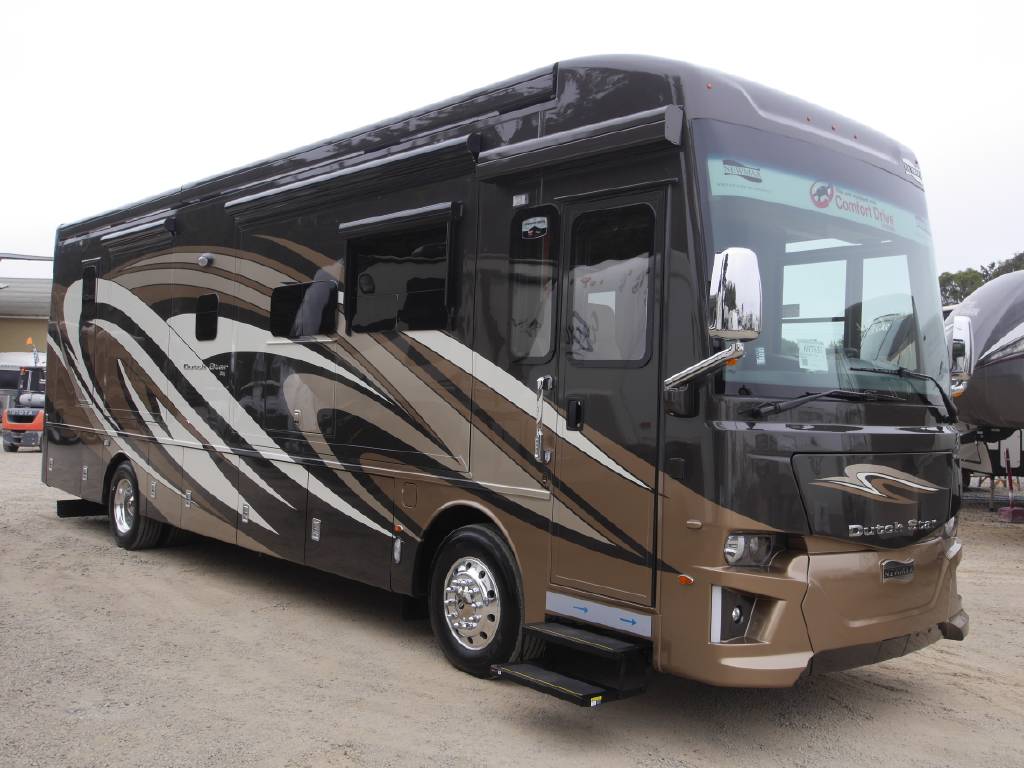
- Layout and Amenities: The internal layout and amenities of the RV are crucial for a comfortable living experience. Features like the size of the bed, the functionality of the kitchen area, the storage capacity, and the bathroom facilities need to be considered. For instance, an inadequately sized kitchen can make daily cooking a hassle, while insufficient storage can lead to clutter and disorganization.
- Type of RV: There are different types of RVs, including motorhomes, travel trailers, fifth wheels, and campervans, each with its pros and cons. Motorhomes offer convenience as they combine the vehicle and living space, but they can be expensive and challenging to maintain. Travel trailers and fifth wheels need a separate towing vehicle but provide the flexibility of having a vehicle for local travel. Campervans are easier to drive and park but offer limited living space.
- Lifestyle Compatibility: Different RVs suit different lifestyles. For example, a retired couple traveling leisurely might prefer a different type of RV compared to a young family with children or remote workers who need office space. Not considering these lifestyle aspects can lead to a mismatch between the RV and the owner’s needs.

- Quality and Reliability: Quality and reliability are crucial, especially for a home on wheels. A less reliable RV can lead to frequent breakdowns and repair costs. Sometimes, in an effort to save money, individuals might opt for older or less expensive models, which can end up costing more in the long run due to maintenance issues. No matter what type of RV you end up getting one thing we can’t recommend enough is to get an inspection done before purchase.
- Resale Value: The potential resale value of the RV is another factor often overlooked. Some RV models and brands hold their value better than others. Ignoring this aspect can lead to financial loss when it’s time to sell or upgrade the vehicle.
- Energy and Utility Needs: Energy consumption and utility needs (like power, water, heating, and cooling) vary significantly between different RVs. Not considering these factors can result in inadequate resources while living off-grid or unexpected costs when using utilities at campgrounds.
👉 Tip: Rent or test-drive different types before you buy. We took 5 years to finally choose our Class A motorhome, and we’re glad we didn’t rush it.
3. Overlooking Insurance and Legalities
Full-time RV life isn’t just about adventure—it’s about paperwork too.
- Insurance Challenges: Full-time RV insurance is more complex than standard vehicle insurance. It’s a hybrid of home and auto insurance, covering the vehicle and the living quarters and possessions inside. Many RVers don’t realize the need for specialized RV insurance that adequately covers the unique risks associated with a home on wheels. Underestimating these needs can lead to inadequate coverage in case of accidents, theft, or damage.

- Domicile Issues: One of the most significant legal challenges for full-time RVers is establishing a legal domicile – a permanent legal residence. While RVers may travel constantly, the law requires a permanent address for various purposes like taxation, voting, banking, and insurance. Choosing a domicile state affects many aspects of an RVer’s life, including income tax rates, vehicle registration fees, and insurance costs. Not carefully considering domicile can lead to unintended tax liabilities and other legal issues. While you can have your domicile anywhere, Texas, Florida and South Dakota are popular choices for RVers.



- Vehicle Registration and Driver’s Licenses: Full-time RVers must ensure their vehicle is properly registered in their domicile state. This process can vary significantly from state to state and may involve inspections, emissions tests, and additional fees. Additionally, some states require a special driver’s license to operate larger RVs, which might necessitate additional testing or certification.
- Health Insurance and Access to Medical Care: Health insurance is another critical consideration. Coverage options and costs can vary dramatically by state. For full-time RVers, who may need medical care in various locations, finding a plan that provides nationwide coverage is essential. Overlooking this aspect can lead to substantial out-of-pocket costs for medical treatment outside the home state.
- Tax Considerations: Tax implications are a complex part of full-time RVing. Income tax, sales tax, and personal property tax considerations depend on the domicile state. Understanding these tax obligations is crucial to avoid unexpected tax bills and potential legal issues.

- Estate Planning and Legal Documents: Keeping legal documents up-to-date, including wills, power of attorney, and health care directives, is important for full-time RVers. These documents should reflect the current legal domicile and adhere to its laws to ensure they are valid.
- Compliance with Local Laws and Regulations: As full-time RVers move from place to place, they must comply with local laws and regulations, which can vary widely. This includes parking regulations, length of stay limitations in campgrounds, and specific rules in national parks and other public lands.
👉 Tip: Research your domicile carefully. It affects your wallet, health insurance, and legal rights.
4. Lack of Space and Privacy
Living in an RV means close quarters, always.
- Limited Personal Space: RVs, by nature, offer limited square footage compared to traditional homes. This confined space can quickly feel crowded, especially when shared with family members or pets. The lack of personal space can lead to feelings of being cramped and can heighten tensions among occupants. Activities that require space, like hobbies or exercise, become harder to manage.

- Privacy Concerns: In an RV, privacy is often a luxury. Thin walls and close quarters mean that sound travels easily, making private conversations difficult. This can be particularly challenging for families, where parents and children may struggle to find personal time and space. For couples, maintaining intimacy without the usual privacy can be a delicate balance.
- Managing Different Schedules and Routines: In a traditional home, it’s easier to accommodate different schedules and routines, but in an RV, this becomes more complicated. For instance, if one person is an early riser and the other a night owl, the confined space can make it difficult for both to maintain their preferred routines without disturbing the other.
- Work and School in Close Quarters: For families with children who are schooling, or for those who work remotely from their RV, the lack of a dedicated workspace can be a significant challenge. Balancing work or school responsibilities in a space that is also your living area requires careful planning and organization.
- Limited Storage and Belongings: Full-time RVing often means downsizing possessions to the essentials due to limited storage. The inability to have personal items, from books to hobby materials, can contribute to a sense of loss and frustration.
- Adapting to Shared Spaces: Common tasks such as cooking, cleaning, and relaxing occur in shared spaces. This constant proximity can strain relationships as individuals struggle to perform daily activities without stepping on each other’s toes.

- Solutions and Adaptations: To mitigate these challenges, many full-time RVers develop creative solutions. They might establish ‘quiet hours’, use room dividers or curtains for added privacy, or schedule time outside the RV for individual activities. Some even choose RV models with separate rooms or expandable living areas to provide more personal space.
👉 Tip: Choose an RV with slide-outs or separate rooms if possible, and set “quiet hours” or routines to keep peace.
5. Social Isolation
While RVing lets you meet tons of new people, relationships are often temporary.
- Challenges in Maintaining Long-Term Relationships: One of the main issues full-time RVers face is the difficulty in sustaining long-standing friendships and family connections. Being on the move means they are rarely in one place long enough to nurture and maintain these relationships in the traditional sense. The physical distance can lead to a gradual drift in relationships that were once close.
- Difficulty in Building New Relationships: While RVing does provide opportunities to meet new people, these interactions are often transient. The constant movement means that relationships formed on the road are typically short-lived, making it hard to develop deeper connections. This can be particularly challenging for those who thrive on stable and long-term social circles.

- Impact on Children’s Social Development: For families with children, full-time RVing poses unique challenges in terms of the children’s social development. The lack of consistent peer groups, as found in traditional schooling or neighborhoods, can affect their ability to form lasting friendships and social skills.
- Limited Community Engagement: Being part of a community often involves regular, ongoing interactions and participation in local events. For full-time RVers, their ever-changing location makes it difficult to engage deeply with any single community, leading to a sense of being perpetual outsiders.
- Reliance on Technology for Socialization: While technology like social media and video calls can help bridge the gap, they are not complete substitutes for face-to-face interactions. Overreliance on digital communication can sometimes exacerbate feelings of isolation.
- Seasonal Loneliness: The lifestyle can also lead to seasonal loneliness, especially during holidays or special occasions, when being away from family and long-term friends can be more pronounced.
- Strategies to Combat Isolation: Many full-time RVers adopt strategies to combat social isolation. These include joining RV clubs or online communities, planning periodic visits with family and friends, participating in local activities and events at their temporary locations, and even traveling in convoys with other RVers to foster a sense of community on the road.
- The Importance of Balancing Solitude and Socialization: Full-time RVing requires a balance between enjoying the lifestyle’s solitude and independence and actively seeking out social interactions. Being proactive in socializing and recognizing the signs of isolation is key to maintaining a healthy and fulfilling full-time RV lifestyle.
👉 Tip: Join RV clubs, travel with friends, or attend rallies. Online RV groups help, but face-to-face connections matter too.
6. Internet Connectivity Issues
If you work remotely, internet is your lifeline—and it can be frustrating.
- Dependency on the Internet for Work and Communication: For remote workers, digital nomads, and even students engaged in online learning, consistent and reliable Internet access is non-negotiable. Full-time RVing often takes individuals to remote or rural areas where high-speed internet options are limited or non-existent. This can disrupt work schedules, productivity, and even result in financial losses or educational setbacks.
- Variability of Signal Strength and Reliability: Even in areas with internet coverage, signal strength can vary wildly. RV parks and campgrounds may offer Wi-Fi, but the quality is often poor, especially when many users are connected simultaneously. This inconsistency makes it difficult to plan activities that require a stable internet connection, such as video conferencing, streaming, or large file downloads.
- Additional Costs and Technical Complexity: To mitigate these issues, full-time RVers might invest in satellite internet, cellular data plans, signal boosters, or Wi-Fi extenders. However, these solutions can be expensive and require a certain level of technical expertise to set up and maintain. They also add to the overall cost of RV living, which can be a financial strain.

- Restricted Location Choices: Internet connectivity can dictate where RVers can travel and stay, especially for those who work online. This necessity can limit the freedom and spontaneity that are often the appeal of RV living. Instead of choosing locations based on beauty or interest, the decision might hinge on whether there’s a strong enough signal to meet online obligations.
- Impact on Leisure and Downtime: Beyond work and education, internet connectivity affects leisure activities and downtime. Streaming movies, playing online games, or simply browsing the internet can be challenging with poor connectivity, impacting the overall quality of life and relaxation opportunities.
- Planning and Research Requirements: RVers often find themselves spending considerable time researching and planning their travel routes and destinations based on internet availability. This can be time-consuming and sometimes limits the sense of adventure that comes with spontaneous travel.
- Solutions and Workarounds: To combat these challenges, some RVers schedule their travel around known Wi-Fi hotspots or stay in locations near towns and cities with better infrastructure. Others create a blend of online and offline activities to reduce dependence on the internet, while some choose to adapt their work to be more offline-friendly.
👉 Tip: Build a redundancy plan: cellular hotspot + booster + Starlink if you need rock-solid internet.
7. Weather and Climate Challenges
We try to “chase 70 degrees,” but it doesn’t always work out.
- Exposure to Extreme Temperatures: One of the most common challenges faced by full-time RVers is dealing with extreme temperatures. In summer, RVs can become uncomfortably hot, especially if they are not equipped with efficient air conditioning. Conversely, in winter, inadequate heating can make an RV feel like a refrigerator, leading to issues like frozen pipes and discomfort. This lack of preparedness for extreme temperatures can impact health and overall well-being.

- Storms and Severe Weather Events: RVers are also often caught in storms, including high winds, heavy rains, and even tornadoes or hurricanes in certain areas. An RV, being a less stable structure than a traditional home, is more vulnerable to damage in these conditions. Not only can this lead to costly repairs, but it also poses significant safety risks.
- Humidity and Its Effects: High humidity levels can be particularly troublesome in an RV. It can lead to condensation issues, resulting in mold and mildew growth, which are not only damaging to the vehicle but also pose health risks. On the other hand, very low humidity can cause discomfort and respiratory issues.
- Lack of Weather-Specific Gear: Often, RVers regret not investing in weather-appropriate gear. This includes things like thermal insulation for cold climates, dehumidifiers for humid areas, sturdy awnings for sun and rain protection, and weather radios for storm alerts. Not having these items can greatly diminish the comfort and safety of RV living.

- Difficulty in Forecasting and Planning: While on the road, it can be challenging to keep up with weather forecasts, especially when moving across different regions. This can lead to being caught unprepared for sudden weather changes. Moreover, planning travel routes and stops around weather conditions can be complex and sometimes restricts freedom of movement.
- Impact on Lifestyle and Activities: Weather conditions can significantly affect day-to-day activities and lifestyle choices. Outdoor activities might have to be canceled or modified due to weather. Likewise, indoor space can become cramped and uncomfortable in bad weather, impacting overall enjoyment and mental health.
- Adapting to Different Climates: Adjusting to different climates can be physically and mentally taxing. The body may struggle to acclimate to rapid temperature changes, and the mental stress of constantly adapting to new environments can be draining.
- Strategies for Coping: Many full-time RVers learn to adapt by becoming more proficient in weather forecasting, choosing travel routes based on favorable climates, and equipping their RVs with the necessary gear to handle various weather conditions. They also learn to have flexible plans, allowing them to move to safer or more comfortable areas when extreme weather is forecasted.
👉 Tip: Carry weather gear like dehumidifiers, insulation kits, and weather radios. Stay flexible with your travel plans.
8. Difficulty in Routine Health Care Access
Accessing doctors and prescriptions isn’t simple when you’re always moving.
- Challenges in Finding Consistent Healthcare Providers: For full-timers, establishing a long-term relationship with healthcare providers is difficult. Regularly moving from one place to another means they often can’t visit the same doctors, dentists, or specialists consistently. This lack of continuity can impact the quality of care, as new providers aren’t always fully aware of the patient’s medical history or ongoing treatments.
- Complications in Prescription Refills and Management: Managing prescriptions is another significant hurdle. Different states have varying prescription laws, and transferring prescriptions from one pharmacy to another can be cumbersome. For those on medications that require regular refills or are controlled substances, this can lead to gaps in medication, which can be detrimental to their health.

- Emergency Medical Services Access: In emergency situations, being in unfamiliar locations can add stress and delay in receiving care. RVers often find themselves in remote areas where the nearest hospital or clinic is far away, and the quality of medical facilities may vary greatly from place to place.
- Health Insurance Limitations and Coverage Issues: Health insurance coverage can be another major concern. Many insurance plans have network restrictions or offer limited coverage in certain areas, making it difficult to receive care while on the road. RVers may also face higher out-of-pocket costs due to being out of network.
- Managing Chronic Health Conditions: For those with chronic health conditions, regular monitoring and check-ups are essential. The transient nature of RV living makes managing these conditions more challenging, as consistent follow-up and care continuity are key to effective management.
- Preventive Care and Routine Check-ups: Routine preventive care, like annual physicals, dental cleanings, and eye exams, can fall by the wayside when constantly moving. This can lead to minor issues becoming more serious due to lack of early detection.

- Impact on Mental Health Services: Accessing mental health services can also be challenging. Establishing a rapport with a therapist or counselor usually requires regular, ongoing sessions, which is difficult when frequently changing locations.
- Adaptation Strategies: To mitigate these issues, some full-time RVers plan their routes around major cities with known healthcare facilities. Others use telemedicine services for consultations and follow-ups, which can be particularly useful for non-emergency medical advice. Additionally, maintaining a comprehensive and up-to-date medical record is crucial for sharing with new healthcare providers.
👉 Tip: Use telehealth, keep digital medical records, and plan travel around major cities if you need specialist care.
9. Maintenance and Mechanical Failures
Something will always need fixing.
- Frequent Maintenance Requirements: RVs, much like any vehicle, require regular maintenance to ensure smooth functioning. This includes routine checks and servicing of engines, brakes, tires, and electrical systems. However, the maintenance needs of an RV are often more complex due to the combination of vehicular and home systems (like plumbing and heating). The constant movement and exposure to different environments and road conditions accelerate wear and tear, necessitating more frequent maintenance than a typical vehicle or home. I always say having an RV is like driving a 7.5. magnitude earthquake down the road. Things shake and rattle apart. There always seems to be something that needs to be repaired.
- Unexpected Mechanical Failures: Mechanical failures can occur unexpectedly and can range from minor issues to major breakdowns. Engine problems, transmission failures, brake issues, or electrical malfunctions are not just inconvenient but can also leave RVers stranded in remote locations. These failures can be particularly stressful if they occur in areas with limited access to repair services. Our biggest unexpected repair was our slide system getting stuck. Thankfully our extended warranty covered a majority of the $1600 bill.

- Cost of Repairs and Maintenance: The cost of maintaining and repairing an RV can be substantial and often catches new RVers off guard. Specialized RV parts and labor can be expensive, and in some cases, RVs might need to be taken to specific dealers or repair shops, which can add to the cost. Additionally, older or more unique models may require hard-to-find parts, further increasing expenses.
- Skill and Knowledge Requirements: Many RVers quickly learn that having basic mechanical skills and understanding of their vehicle’s systems is invaluable. Being able to address minor repairs and maintenance tasks on their own can save time and money. However, for those who are not mechanically inclined, this learning curve can be daunting and frustrating.
- Impact on Travel Plans: Mechanical issues can significantly disrupt travel plans. Delays due to repairs can lead to missed reservations, altered routes, or shortened stays at desired locations. This unpredictability can be one of the more stressful aspects of living full-time in an RV. Our slide issue delayed our moving by 6 weeks while we waited for parts. Thankfully we didn’t have any plans we needed to change and we could just sit and wait for parts.
- Importance of Regular Inspections: Regularly inspecting and servicing the RV can help prevent some mechanical issues. This includes checking tire pressure, engine fluids, battery life, and ensuring all systems are functioning correctly before embarking on long journeys.
- Emergency Preparedness: Carrying basic tools, spare parts, and having a roadside assistance plan can provide peace of mind and help in managing unexpected breakdowns. Being prepared for emergencies, including having a contingency fund for repairs, is crucial in full-time RVing.
👉 Tip: Learn basic RV repair skills, carry spare parts, and keep an emergency fund for breakdowns.
10. Lifestyle Burnout
RVing sounds like a constant adventure—but it can get exhausting.
- Loss of Novelty: Initially, the constant travel and exploration of new places can be exhilarating. However, as time passes, what was once exciting can become routine. The continuous cycle of packing, moving, and setting up in a new location can start to feel tedious, and the novelty of new experiences may diminish. In our first year, we moved every 3-4 days and became burned out. Now we like to stay somewhere for at least a week before moving.

- Lack of Permanent Community: While RVing allows for meeting diverse people and forming connections across different regions, these relationships are often transient. The lack of a permanent community or neighborhood can lead to feelings of isolation and loneliness for some. The absence of long-term neighbors, regular social gatherings, and community involvement can contribute to a sense of disconnection.
- Craving Stability and Routine: The unpredictable nature of RV life, while appealing to some, can be draining for others. The lack of a consistent routine and the constant need to adapt to new environments can be mentally and emotionally exhausting. Over time, there can be a growing desire for stability, predictability, and the comfort of familiar surroundings.
- Challenges in Maintaining Relationships: Maintaining relationships with family and friends can be challenging when constantly on the move. Physical distance and differing time zones can strain relationships, making it difficult to stay connected and participate in significant life events.
- Weariness from Planning and Logistics: Full-time RVing involves a lot of planning – from mapping routes to booking campsites and managing travel logistics. This continuous planning, coupled with dealing with unexpected issues like vehicle repairs or weather changes, can lead to burnout. The mental load of always having to think ahead can be overwhelming.

- Desire for More Space and Amenities: Living in a confined space with limited amenities can also contribute to lifestyle burnout. Over time, the desire for more living space, a permanent address, and access to amenities like a full kitchen, larger bathroom, or a regular bedroom can become more pronounced.
- Environmental Fatigue: Constant exposure to different climates and environments, dealing with inclement weather, or even adapting to high or low altitudes can take a toll on one’s health and well-being.
- Reflecting on Life Goals and Priorities: As individuals evolve, so do their life goals and priorities. What might have been an exciting and fulfilling lifestyle at one point can change as personal, professional, and family priorities shift.
👉 Tip: Slow down. Stay longer in places you love. Many RVers avoid burnout by shifting to part-time or seasonal RVing.
Final Thoughts on Full-Time RV Regrets
It’s important to note that while these are common challenges and regrets commonly experienced by many, it’s crucial to recognize that full-time RVing also brings numerous joys and rewards. Many people find this lifestyle to be incredibly fulfilling and enriching, offering experiences and a quality of life that traditional living cannot match. The key to enjoying this unique lifestyle is thorough preparation and setting realistic expectations.
- Experiencing Freedom and Flexibility: One of the most celebrated aspects of full-time RVing is the sense of freedom it provides. Being able to travel anywhere, anytime, and change your surroundings based on preference or season is a liberating experience. This flexibility allows individuals to explore new places, cultures, and natural wonders at their own pace.
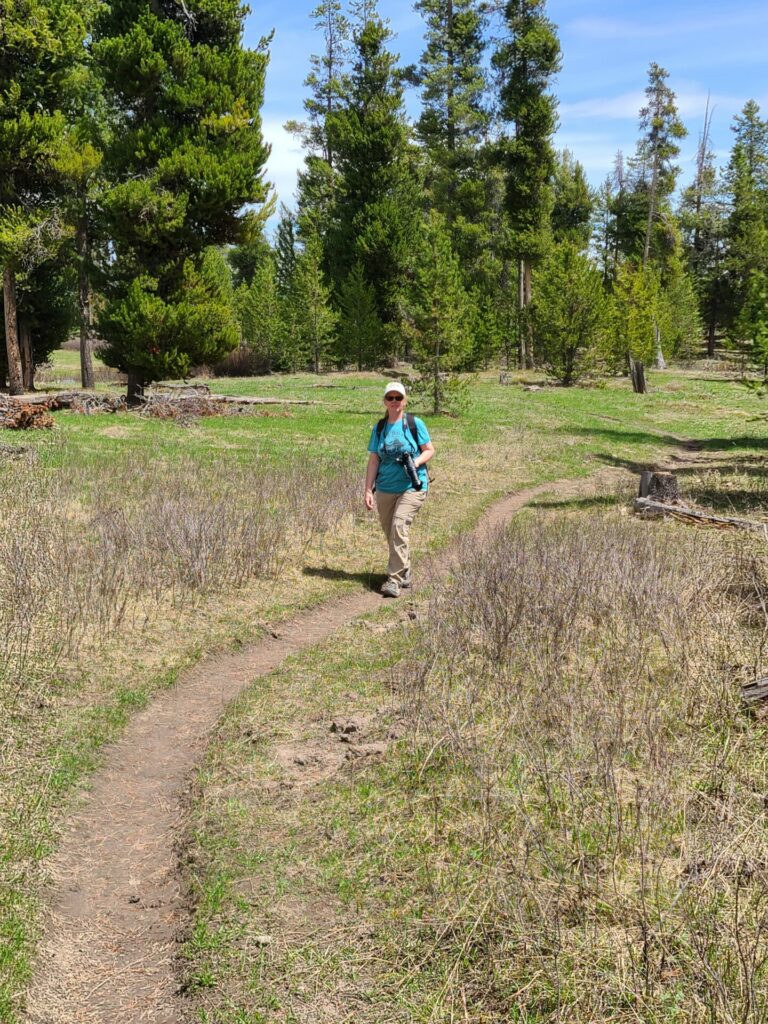

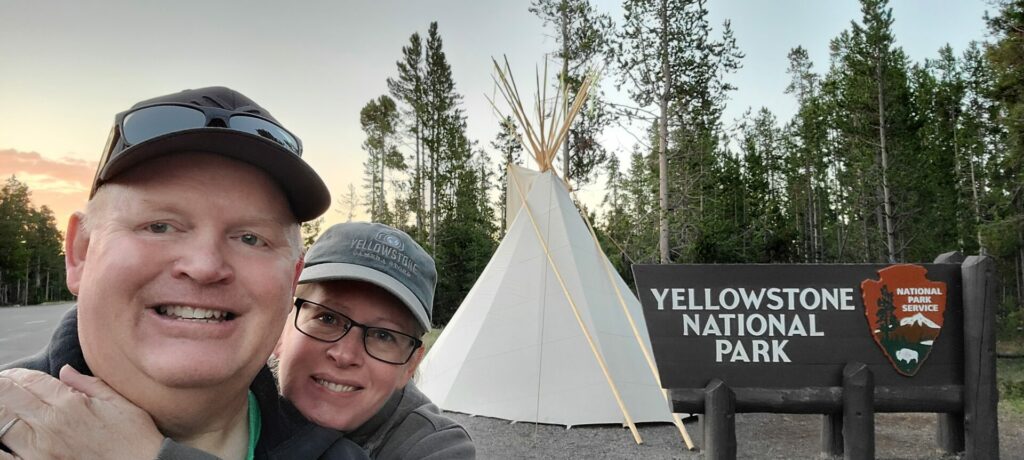
- Building a Community on the Road: While there’s a lack of a permanent geographical community, full-time RVers often find a strong sense of community with fellow travelers. There are numerous groups and networks for RVers where experiences, advice, and support are shared. This community can be incredibly tight-knit and supportive.
- Connecting with Nature: Full-time RVing allows for a closer connection to the outdoors and nature. Many find peace and rejuvenation in spending time in various natural settings, from beaches to mountains to forests, experiencing the beauty and serenity of the natural world more intimately.
- Simplifying Life: Living in an RV means living with less, which many find liberating. This minimalistic lifestyle can lead to a greater appreciation for the simpler things in life and can be a journey toward discovering what is truly important.
- Personal Growth and Learning: The challenges and experiences of RV life often lead to significant personal growth. Navigating new places, dealing with unexpected situations, and adapting to different environments can enhance problem-solving skills, resilience, and flexibility.
- Thorough Preparation: Successful full-time RVing is often a result of thorough preparation. This includes researching the right RV, understanding the financial aspects, preparing for maintenance, and being aware of the legalities and insurance requirements. The more prepared individuals are, the smoother their transition to RV life can be.
- Setting Realistic Expectations: Understanding the realities of RV life is crucial. Acknowledging that there will be challenges along with the adventures helps in setting realistic expectations. This mindset allows individuals to better cope with and enjoy the journey.
- Flexibility and Adaptability: The ability to adapt and be flexible is key in full-time RVing. Being open to changing plans, learning from experiences, and adjusting one’s lifestyle as needed can significantly enhance the RVing experience.
With preparation and balance, you’ll spend less time regretting and more time exploring.
Thank you for taking the time to read our article. Please share your experiences or drop a question below! Don’t forget to follow our journey on social media for more Full-Time RV Living, Traveling, Outdoor Adventures, Stories, and Tips.
If you’re looking to build your own home-based business like we have with this webpage, check out Wealthy Affiliate.
Wealthy Affiliate is an all-in-one platform that you can build your whole affiliate marketing business on. It combines training, software, and website hosting into one. This makes the whole process of starting an online business from scratch much easier, especially if you’re new to building a website.

